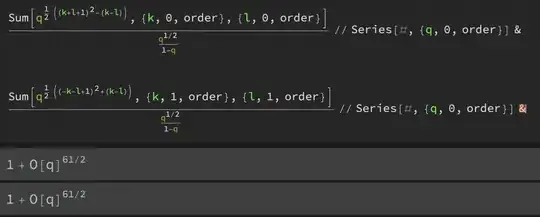While studying some physics problems, I stumbled upon this experimental equality:
$$ \sum_{k, \ell = 0}^{+\infty} q^{\frac{ 1 }{ 2 }[( k + \ell + 1)^2 - (k- \ell)]} = \frac{ \sqrt{q} }{ 1-q } \ . $$
I have checked this equality with Mathematica to a very high order:
However, I wonder how to prove it? Is it (or its generalization) discussed somewhere? (the sum smells like some $\Theta$-function, but I don't know where to look).
Update:
It turns out that the series above equals the false theta function $g_{1,1,1}(-1, -q, q)$ discussed in this paper https://www.sciencedirect.com/science/article/pii/S0022314X18300611 . It remains to educate myself about these special function
